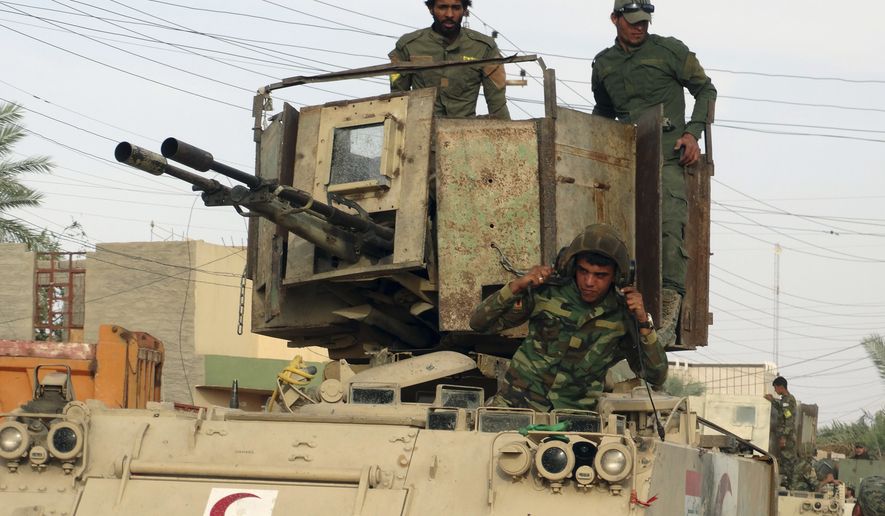Iran has positioned thousands of loyal Iraqi Shiite militia fighters around Mosul with a strategic goal of creating long-lasting armies inside Iraq that can also deploy as an expeditionary force to Syria, Yemen and other contested regions, analysts say.
The Iranian-sponsored Hezbollah Brigades, Badr Organization and other groups fall under the Baghdad-approved umbrella group known as the Popular Mobilization Forces. These mostly Shiite groups — some moderate, some extremists — are distinct from but coordinate with the Iraqi regular army, police and counterterrorism units. The ultimate goal is the same: Evict the Sunni extremist group Islamic State from the country.
But the Iranian-backed groups, guided by on-the-ground advisers from the Revolutionary Guard Corps’ notorious Quds force, have regional goals as well. They are geared toward what the U.S. intelligence community sees as Tehran’s desire to dominate the region and blunt American influence.
The U.S. designated the Hezbollah group as a terrorist organization in 2009. It is responsible for the deaths of hundreds of American service members during the first war in Iraq.
There are an estimated 80,000 Iraqi fighters under Iran’s direction. Many are now positioned west of Mosul, where there is heavy fighting as part of the month-old coalition’s campaign to free the last major urban area still in the clutches of the Islamic State.
Analysts say the militias are hunting fighters from Islamic State, also known as ISIS and ISIL, trying to make an escape into the group’s base in Syria, but will not take part in the ongoing invasion into Mosul proper or the nearby town of Tal Afar because of concerns of sectarian tensions.
Patrick Martin, a military analyst with the nonprofit Institute for the Study of War in Washington, said the militias fight separately from the government’s Iraqi Security Force (ISF). They are not particularly good at close-in urban warfare — the kind of street-to-street battles going on in Mosul. Instead, they focus on clearing small villages, encircling the town of Tal Afar and patrolling desert escape routes along the Syrian border.
“Perhaps the most notable thing is that almost every Iraqi Shia militia is participating or is trying to participate in operations near Mosul in order not to be left out, as participating in Mosul operations and recapturing Tal Afar are huge for the legitimacy of the Popular Mobilization Force,” Mr. Martin said.
“There’s a very big push among the most senior militia leaders to enshrine the Popular Mobilization Force as a permanent security force,” he added. “It would effectively allow the individual leaders to have a lot more say and access to resources and a sense of legitimacy in a way they’ve never really experienced before.”
Iran, Mr. Martin added, now has in place loyal Iraqi proxy leaders and a force that “is not under command and control of Iraqi government, is very cheap to maintain and has a modular aspect to it that Iran could use to deploy to other theaters that require manpower.”
Post-Mosul fears
Many fear that the real trouble could erupt for Baghdad after Mosul is reclaimed from Islamic State, given the mixed motives and clashing agendas within the U.S.-backed coalition and the simmering distrust between the Sunnis, Shias, Kurds and other ethnic minorities in the area. Will Iran direct its militias to kill former Baathist Party officials in the Saddam Hussein regime who operated an anti-American insurgency? Will they pick fights with Kurdish forces north of Mosul and with Sunni militiamen?
Michael Rubin, an expert on Iran at the American Enterprise Institute, said Iran’s leaders “believe they can win on a number of fronts” by stationing loyal Iraqis around Mosul.
“Controlling the region between Mosul and the Syrian border will allow Iran greater ability to supply Syrian proxies by land,” he said. “Then there’s ideology. We look at Iran through a sectarian lens, as representing Shiite Muslims. It’s important to recognize that, from Iran’s point of view, the Islamic republic represents all Muslims, so from Tehran’s perspective, why shouldn’t they be in Mosul?”
He added, “If the Iranians have greater presence along the length of Iraqi Kurdistan, they can also be spoilers in case the Iraqi Kurds ever do seek to separate. That’s a precedent Iran fears given its own ethnic diversity.”
Asked about the role of militia forces near Mosul, Air Force Col. John Dorrian, the chief U.S. military spokesman in Baghdad, told The Washington Times:
“Popular Mobilization Forces are operating to the west of Mosul in the vicinity of the Tel Afar Airport, which is well south of Tel Afar city. They are clearing villages in the area and securing roads that ISIL might otherwise be able to use to escape west from Mosul.”
The colonel said that, while there have been reports of heavy fighting between the Iran-backed militias and Islamic State forces, “in accordance with plans announced by the government of Iraq, the PMF have announced that they are not going into Mosul or Tel Afar, and they have not.”
Col. Dorrian pointed out that, “Popular Mobilization Forces are not all affiliated with Iran, and many include members from diverse ethnic and sectarian backgrounds.”
Meanwhile, Iran’s state-controlled media feeds its readers a constant stream of upbeat reports on the performance of its proxy militias in the Mosul fight.
“Hashd Al-Sha’abi Kicks Off 3rd Phase of Mosul Operation,” said a Nov. 14. headline in the Fars News agency. Hashd Al-Sha’abi is Arabic for the Popular Mobilization Forces.
The story said the forces took control of more territory to cut off exit routes to Raqqa, the Islamic State’s Syrian headquarters.
“The main purpose of the third phase of the military operations in Western Mosul is to help Iraq’s joint military forces to take control of the remaining areas,” Fars quoted Hashd al-Sha’abi Spokesman Ahmad al-Assadi as saying.
• Rowan Scarborough can be reached at rscarborough@washingtontimes.com.




Please read our comment policy before commenting.